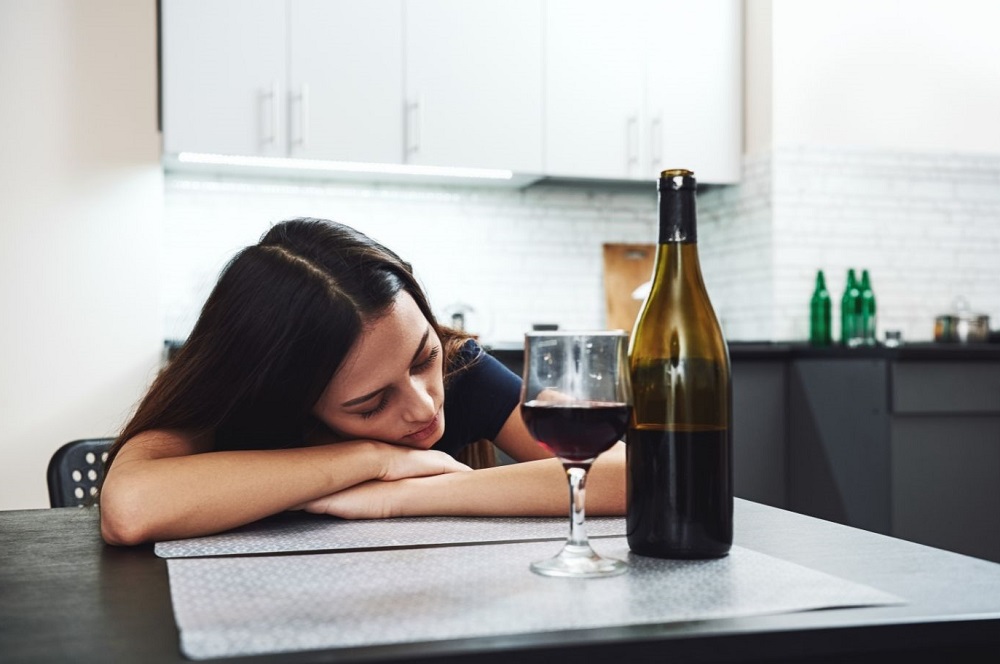If you’ve ever indulged in a drink or two then you’ll already know that alcohol can have a number of effects, including making you feel drowsy.
However, those who are curious might be wondering: Does wine make you sleepy?
In this article, I cover some key information about wine and sleep, from whether wine makes you sleepy to how much wine it takes to affect sleep.
Keep reading to find out more.
Does wine make you sleepy?
Yes, drinking wine, beer, or hard liquor during the day can make you feel drowsy or lethargic. This comes down to the fact that alcohol depresses the central nervous system. It has a sedative effect that helps you relax and makes you drowsy, allowing you to fall asleep faster.
When you drink wine, this sedative quality often robs you of energy, making you feel sluggish and like you could do with a long nap. If you didn’t sleep well the previous night, even one drink can make you drowsy.
This is especially true if you drink during one of your usual low-energy times such as during the mid-afternoon or late at night.
That being said, this sedative effect doesn’t last for the duration of the night. While it makes you fall asleep faster, wine and other types of alcoholic drinks can significantly affect the amount of sleep you get overall in a night.
Once you have fallen asleep initially, following the first few hours of sleep you are likely to wake up multiple times during the night. Drinking alcohol is known to lead to fragmented sleep and frequent waking for a few reasons that include but are not limited to:
Disrupted circadian rhythm – Alcohol can disrupt your circadian rhythm as your body metabolizes the alcohol. As the sedative effects begin to wear off as you sober up, this interference can cause you to wake up more frequently throughout the night.
Vivid dreams – Ever woken up from a crazy dream after a night of drinking? It’s relatively normal. Alcohol has been known to increase your chances of having vivid dreams, nightmares, or experiencing sleepwalking.
Peeing frequently – When you’ve had a lot to drink, you have a frequent need to urinate. The diuretic effect of alcohol causes your body to release more water in the way of urine. As a result, you wake up much more than you usually would to pee!
Less REM sleep – Alcohol has been associated with reduced rapid eye movement or REM sleep. REM sleep is the deepest stage of sleep that plays a fundamental role in memory and concentration. As you experience less REM sleep after a night of drinking, you are likely to wake up feeling tired and unrested.
How much wine does it take to affect sleep?

Now I’ve established that drinking can disrupt your sleep, you might be wondering how much wine does it take to affect sleep?
Drinking a light to moderate amount of alcohol such as one or two standard drinks of wine probably won’t have too much of an impact on the overall amount of sleep that you get.
However, after a night out you’re much more likely to experience a lot more of that initial non-REM sleep, while significantly reducing the total percentage of REM sleep over the whole night.
If you just feel slightly tipsy, you’re much more likely to get a better night of sleep than if you were drunk. If you feel drunk, you’ll likely pass out quickly but will be in for a restless night.
Is wine good for sleep?
As I’ve addressed above, the real problem with drinking alcohol in the evening comes not with initially falling asleep but much later in the night.
While a drink of wine can help you relax before bed so you get to sleep faster, alcohol is far from being reliable or safe to help you with sleep. You should never rely on wine to help you to get to sleep for a number of reasons.
Alcohol affects everyone differently which comes down to a few factors, such as age, biological sex, and body composition to name a few. It comes down to the individual person.
Bearing this in mind, while one individual might struggle to sleep if they’ve had a drink of wine, another person might find it easier and vice versa.
Additionally, regular drinking is often linked to various mental health conditions such as depression and anxiety and can exacerbate these conditions if you’re not mindful.
Additionally, it is often associated with insomnia and other sleep disorders, so relying on alcohol to get to sleep is not a good habit to get into.
Additionally, individuals who regularly consume alcohol can develop a tolerance to alcohol within three nights. As a result, you will require a larger amount of alcohol to get the same effect.
This is counterproductive, as the more alcohol you have, the less likely you are to get a sound night of sleep.
It’s important that you don’t self-medicate with wine or any other type of alcohol for that matter if you can’t sleep. If you’re struggling to fall asleep or staying asleep on a regular basis, then it’s important that you seek further advice and speak to a healthcare professional. They will be able to rule out any underlying cause for your insomnia and recommend the best treatment for you moving forward.
In summary
Yes, wine and other types of alcohol are known to make you feel sleepy and may help you to fall asleep faster.
That being said, alcohol has a disruptive effect on your sleep and after the first few hours of being asleep, you will often find that you wake up more frequently depending on the amount of alcohol that you have consumed.
You should never rely on wine as a means to help you to go to sleep. If you are struggling to fall asleep or are experiencing broken sleep regularly, you should seek further advice from a healthcare professional.

